NFT Scams - 7 Simple Ways to Stay Protected

NFTs, or non-fungible tokens, have gained immense popularity in recent years. These digital assets provide a unique way to buy, sell, and trade digital art, collectibles, and other virtual items.
However, as with any rapidly growing market, the rise of NFTs has also attracted scammers looking to take advantage of unsuspecting individuals.
In this article, we will explore the topic of NFT scams and provide you with 7 simple ways to stay protected in this exciting but potentially risky landscape.
What are NFT Scams?
NFT scams are fraudulent activities that exploit the popularity of non-fungible tokens. These scams involve the sale of fake or low-value NFTs, deceiving buyers into investing in worthless digital assets.
Scammers impersonate artists or celebrities, taking advantage of the unregulated nature of the NFT market. They may also use phishing attacks to steal funds or access NFT wallets.
To protect themselves, investors should research and verify the authenticity of NFT projects, artists, and platforms before making any purchases or transactions.
10 Most Common NFT Scams
Here is the list of 10 common NFT scams -
1. Fake Artwork and Counterfeit NFTs
One of the most common NFT scams involves the creation and sale of fake artwork or counterfeit NFTs. Scammers may replicate popular digital art pieces or create entirely new ones, passing them off as original and valuable. Unsuspecting buyers may end up paying large sums of money for worthless or stolen artwork.
To protect yourself, it's essential to verify the authenticity of the artwork and the NFT before making a purchase. Research the artist, check for any previous sales or exhibitions, and look for reputable marketplaces or platforms that authenticate the NFTs they list.
2. Rug-Pull Scams
A rug-pull is a fraudulent scheme in which developers generate hype, excitement and anticipation for an NFT (non-fungible token), only to abruptly abandon the project and abscond with a substantial amount of funds raised from investors.
These unscrupulous developers often leverage social media platforms to establish trust and create a buzz around their NFT, while patiently awaiting a surge of investor contributions.
However, as soon as they accumulate a sufficient sum, they abruptly terminate the entire venture and disappear with the amassed funds.
3. Phishing and Impersonation Scams
Phishing and impersonation scams are prevalent in the NFT space. Scammers may create fake websites or social media accounts that closely resemble legitimate NFT marketplaces or artists' profiles. They lure unsuspecting individuals into providing their private keys or personal information, which can lead to the theft of their digital assets.
Always double-check the website URL and ensure you are visiting the official platform. Be cautious of unsolicited messages or emails asking for personal information or private keys. Legitimate NFT marketplaces will never ask for your private keys or passwords.
4. Bidding Scams
Bidding frauds frequently occur in the secondary market when attempting to sell your NFT. Once you list your NFT for sale, scammers strategically place the highest bid, tempting you to finalize the transaction with them.
However, these deceptive individuals can surreptitiously alter the cryptocurrency used for bidding, unbeknownst to you.
To safeguard yourself from falling victim to such scams, it is important to consistently verify the cryptocurrency you are being paid with.
5. Pump and Dump NFT Schemes
Pump and dump schemes are not unique to NFTs but have made their way into the market. In these schemes, scammers artificially inflate the price of a particular NFT by creating hype and promoting it heavily.
Once the price reaches a peak, the scammers sell their holdings, causing the value to plummet and leaving unsuspecting buyers with significant losses.
Be wary of sudden spikes in the price of an NFT and do thorough research before making an investment. Avoid jumping on the bandwagon without understanding the true value of the asset.
6. NFT Airdrop Scams
Airdrop frauds involve scammers who distribute free NFT giveaways through social media platforms. Once users visit the provided link, scammers request them to agree to the specified "terms and conditions."
Additionally, they encourage users to share the message or tweet with others. Once the link is clicked, users are prompted to connect their MetaMask wallet credentials to claim the offered prize.
The credentials entered by users will be stored in the scammers' system. Consequently, the scammers will gain unauthorized access to the user's MetaMask library, enabling them to easily pilfer their assets.
7. Customer Support NFT scams
Customer support scams are unfortunately a common occurrence across various industries. Fraudulent individuals exploit NFT holders by obtaining their contact details through platforms like Discord, Telegram, or Reddit, and then carry out deceptive NFT schemes.
These scammers adopt false personas by creating convincing profiles on legitimate-looking websites. Posing as technical staff from reputable marketplaces, they attempt to manipulate users with enticing offers.
In some cases, these fraudsters even pretend to assist in resolving issues, cunningly extracting sensitive information from unsuspecting consumers.
If you fall prey to their deception and become convinced, these imposters will request your digital collectible's credentials and other sensitive data. Regrettably, once you provide this information, your NFT assets will be stolen by these scammers.
8. Ponzi and Pyramid Schemes
Ponzi and pyramid schemes have also found their way into the NFT space. Scammers promise high returns to early investors by recruiting new participants into the scheme.
These schemes rely on a constant influx of new investors' money to pay off previous investors. Eventually, the scheme collapses, leaving the majority of participants with substantial financial losses.
9. Unverified Platforms and Marketplaces
The rapid growth of the NFT market has led to the emergence of numerous platforms and marketplaces. While many of these platforms are legitimate and reputable, some may be unverified or poorly regulated.
Scammers can take advantage of these unverified platforms to list counterfeit or non-existent NFTs, deceiving buyers and making a quick profit.
Before engaging with a new platform or marketplace, do thorough research to ensure it has a solid reputation and positive user reviews.
Look for platforms that have implemented security measures such as KYC (Know Your Customer) procedures and offer escrow services to protect buyers and sellers.
10. Front Running and Insider Trading
Front-running and insider trading are practices commonly associated with traditional financial markets. However, they can also occur in the NFT space.
Front-running involves purchasing an NFT ahead of a known event or announcement, with the intention of selling it at a higher price once the news is made public.
Insider trading occurs when individuals have access to non-public information about upcoming releases or collaborations and use that information to gain an unfair advantage.
To protect yourself from front-running and insider trading, be cautious of unusually timed sales or rapid price increases ahead of significant announcements. Stick to reputable platforms and marketplaces that have policies in place to prevent these practices.
7 Simple Ways to Stay Protected from NFT Scams
In order to effectively recognize and safeguard yourself against NFT scams, it is crucial to have a comprehensive understanding of their nature and tactics.
By familiarizing yourself with the following information, you will be better equipped to spot and protect yourself from potential fraudulent activities in the NFT space.

1. Research Before You Buy - When considering purchasing an NFT, thorough research is crucial. Take the time to investigate the project, the artist or creator behind it, and the authenticity of the artwork or collectible.
Look for reputable sources of information such as the artist's website, social media profiles, or reliable NFT marketplaces. Verify the history and reputation of the artist, and ensure that the project has a solid track record before making a purchase.
2. Stick to Established Marketplaces - To minimize the risk of falling victim to an NFT scam, it's advisable to stick to established and reputable NFT marketplaces.
Platforms such as OpenSea, Rarible, and SuperRare have established themselves as trustworthy platforms in the NFT space.
These marketplaces have implemented security measures to protect buyers and sellers, making them a safer option compared to lesser-known platforms.
3. Be Wary of Unrealistic Promises - If an NFT project promises extravagant returns or guarantees that seem too good to be true, exercise caution.
Scammers often lure unsuspecting individuals with promises of quick profits or exclusive deals. Remember that NFT investments, like any other form of investment, come with risks.
Be skeptical of projects that make unrealistic claims and always do your due diligence before committing your funds.
4. Double-Check URLs and Wallet Addresses - Phishing attacks are common in the NFT space. Scammers may attempt to trick you into visiting fake websites or sending funds to fraudulent wallet addresses.
Always double-check the URLs of websites you visit and ensure that they are legitimate. Verify wallet addresses with multiple sources before making any transactions. Be vigilant and cautious when interacting with unfamiliar links or addresses.
5. Utilize Security Measures - Protecting your digital assets is crucial in the world of NFTs. Utilize security measures such as two-factor authentication (2FA) to add an extra layer of protection to your NFT marketplace accounts.
Enable 2FA on platforms that offer this feature to prevent unauthorized access to your account. Additionally, consider using a hardware wallet or a secure software wallet to store your NFTs offline and protect them from potential hacks or thefts.
6. Educate Yourself on Smart Contracts - Smart contracts play a significant role in the NFT ecosystem. These self-executing contracts govern the ownership, transfer, and conditions of NFT transactions. It's essential to educate yourself on how smart contracts work and understand the terms and conditions embedded within them.
Familiarize yourself with the contract's code and ensure that it is audited by reputable third-party firms. By understanding the underlying smart contract, you can better assess the legitimacy and security of the NFT project.
7. Stay Informed and Trust Your Instincts - Staying informed about the latest trends, news, and developments in the NFT space is vital to staying protected.
Follow reliable sources, join NFT communities, and engage with experienced collectors and artists. By staying informed, you can spot potential red flags, identify emerging scams, and make more informed decisions.
Trust your instincts and if something feels off or too good to be true, it's better to err on the side of caution.
Also Read - NFT Rarity - What it Means and How to Calculate it?
How NFT Scams Affect the NFT Space?
The prevalence of NFT scams has far-reaching consequences for the NFT space and its stakeholders. Let's explore some of the key impacts:
Loss of Trust and Credibility - NFT scams erode trust and credibility within the NFT community. When investors and collectors fall victim to scams, they become hesitant to participate further, leading to a loss of confidence in the market as a whole.
The lack of trust can hinder the growth and adoption of NFTs, limiting their potential as a legitimate asset class.
Financial Losses for Investors - NFT scams often result in significant financial losses for investors. Whether through Ponzi schemes, fake art purchases, or pump and dump schemes, individuals can lose substantial amounts of money.
These losses not only impact the victims directly but also create a negative perception of NFT investments among potential participants.
Damage to Artists and Creators - NFT scams also harm artists and creators in several ways. When scammers plagiarize or counterfeit their work, it undermines their artistic integrity and can lead to financial losses.
Additionally, the association of scams with the NFT space may discourage genuine artists from embracing NFTs as a platform for showcasing and monetizing their creations.
Examples of NFT Scams
These are few real examples of NFT scams in history
The Beeple's NFT Controversy - One notable example of an NFT scam involves the controversial artist Beeple. In 2021, Beeple's artwork titled "Everydays: The First 5000 Days" was sold for a staggering amount through a major NFT marketplace.
However, it was later revealed that the buyer was associated with the artist himself, raising concerns about market manipulation and the legitimacy of the sale.
The Rarible Rugging Incident - Rarible, a popular NFT marketplace, experienced a rug pull incident in which scammers exploited a vulnerability in the platform's smart contract.
By creating fake NFT listings and manipulating the bidding process, the scammers were able to defraud unsuspecting users, resulting in substantial financial losses.
Frequently Asked Questions
Q1. Are all NFTs scams?
No, not all NFTs are scams. NFTs provide a legitimate and innovative way to buy, sell, and collect digital assets. However, there are scams in the NFT space, and it's important to be cautious and conduct thorough research before making any transactions.
Q2. Can I get my money back if I fall victim to an NFT scam?
Unfortunately, it can be challenging to recover funds lost to NFT scams. Blockchain transactions are often irreversible, and scammers may take measures to remain anonymous.
This is why it's crucial to follow the preventive measures outlined in this article and exercise caution when participating in the NFT market.
Q3. How can I verify the authenticity of an NFT?
Verifying the authenticity of an NFT can be done through various means. Check the reputation and history of the artist or creator, look for official verification badges on marketplaces, and review the project's documentation. Some artists may also provide certificates of authenticity or proof of ownership.
Q4. What should I do if I suspect an NFT scam?
If you suspect an NFT scam, report it to the relevant marketplace or platform immediately. Provide all necessary information and evidence to support your claim. Additionally, consider reporting the scam to appropriate authorities or regulatory bodies to help protect others from falling victim.
Q5. Can I protect my NFTs from being stolen?
While no security measure can guarantee 100% protection, you can take steps to secure your NFTs. Use strong, unique passwords for your accounts, enable 2FA, and consider storing your NFTs in a hardware wallet or secure software wallet. Stay vigilant and regularly update your security practices.
Q6. Are there any regulations governing NFTs?
The regulatory landscape surrounding NFTs is still developing. Different countries may have varying regulations or guidelines concerning NFTs.
It's essential to stay informed about the legal and regulatory implications of participating in the NFT market within your jurisdiction.
Final Thoughts
As the NFT market continues to expand, it is crucial to remain vigilant and informed about the various scams that exist. By understanding the most common NFT scams and taking proactive measures to protect yourself, you can confidently navigate this exciting digital landscape.
Remember to verify the authenticity of NFTs, be cautious of phishing attempts, research before investing, and use reputable platforms. Stay informed and trust your instincts when engaging in the world of NFTs.
Disclaimer
The information provided on this website does not constitute investment advice, financial advice, trading advice, or any other sort of advice and you should not treat any of the website's content as such.
Token Metrics does not recommend that any cryptocurrency should be bought, sold, or held by you. Do conduct your own due diligence and consult your financial advisor before making any investment decisions.
Create Your Free Token Metrics Account

.png)




%201.svg)
%201.svg)


%201.svg)



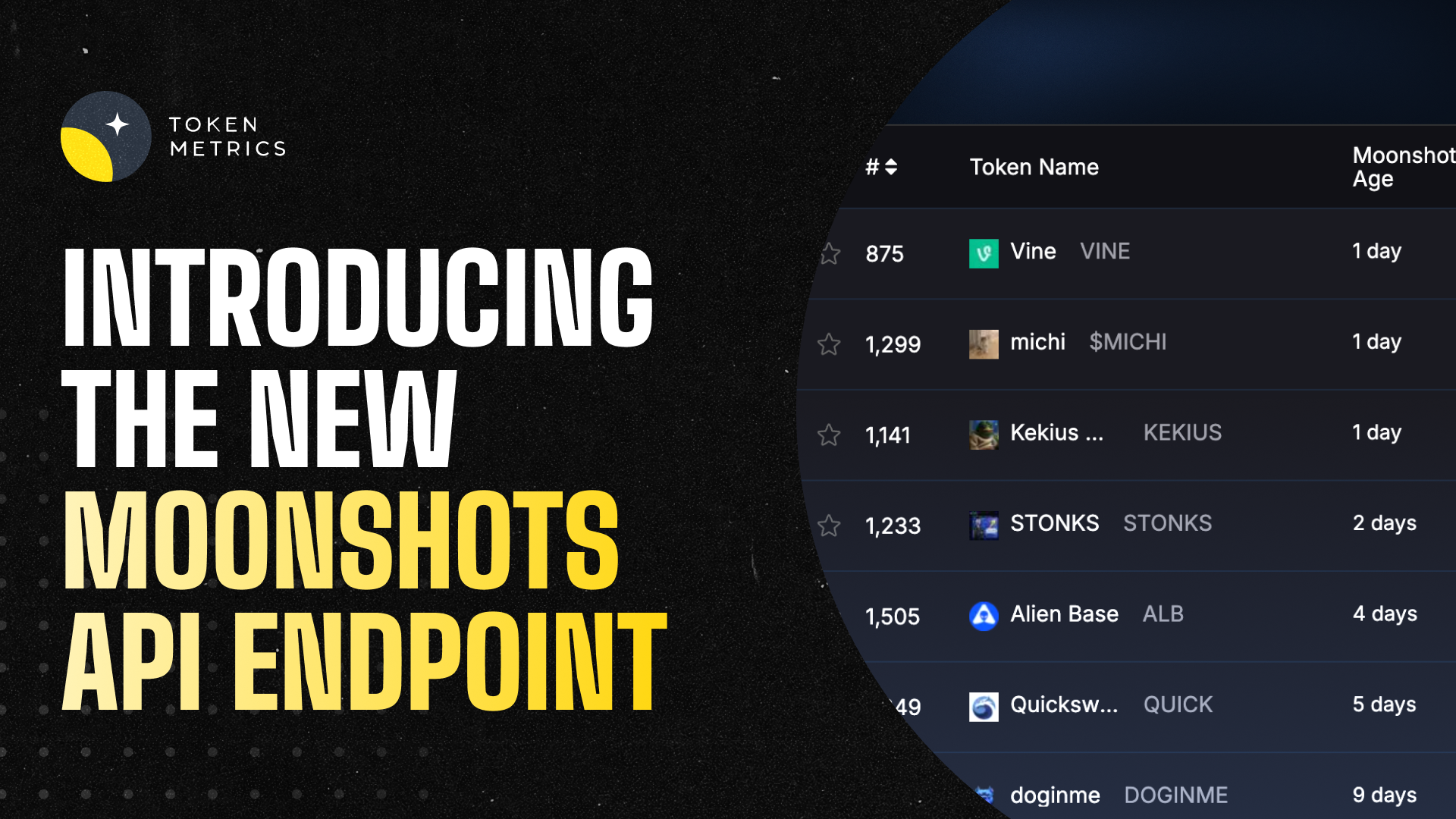
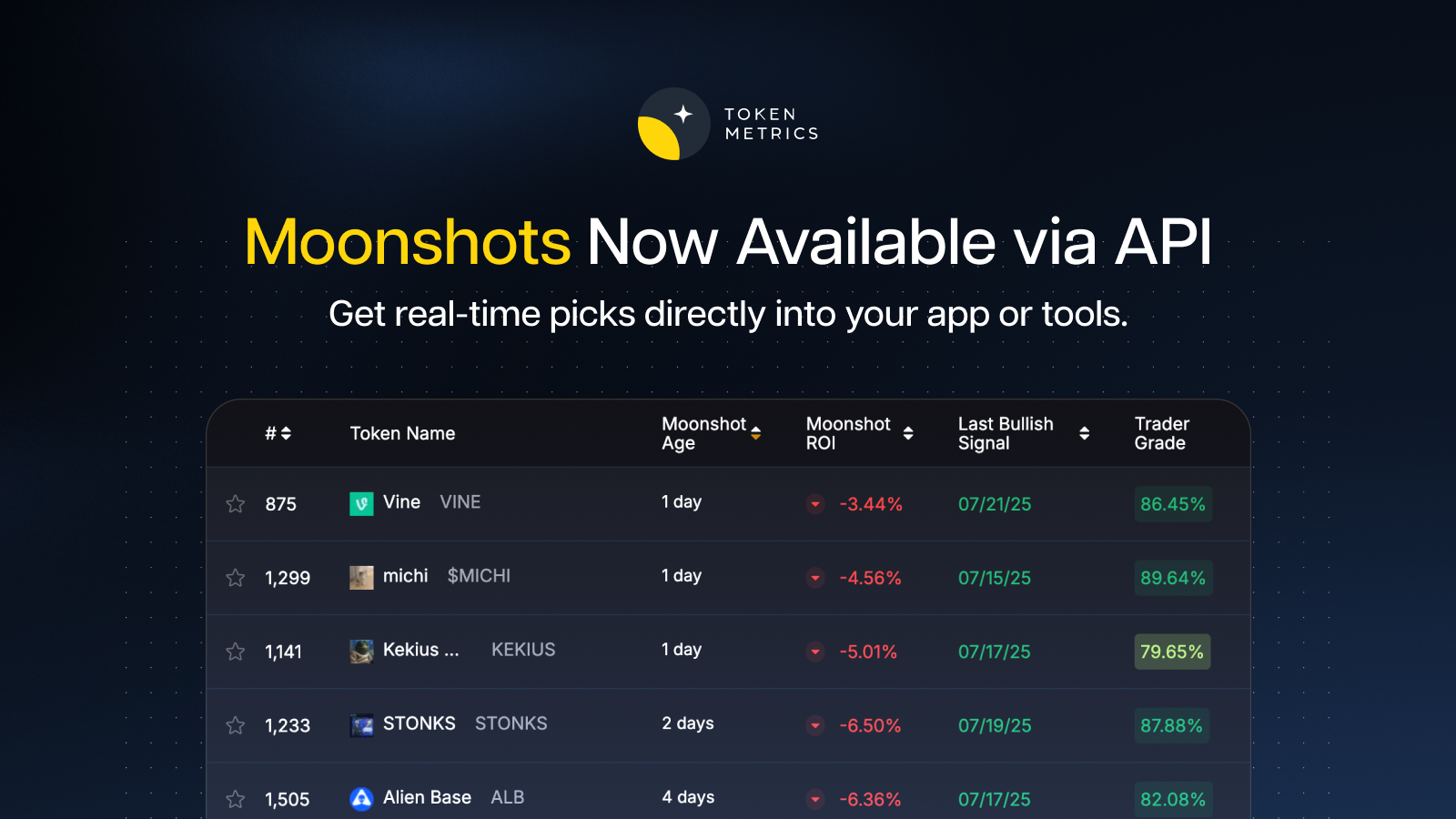

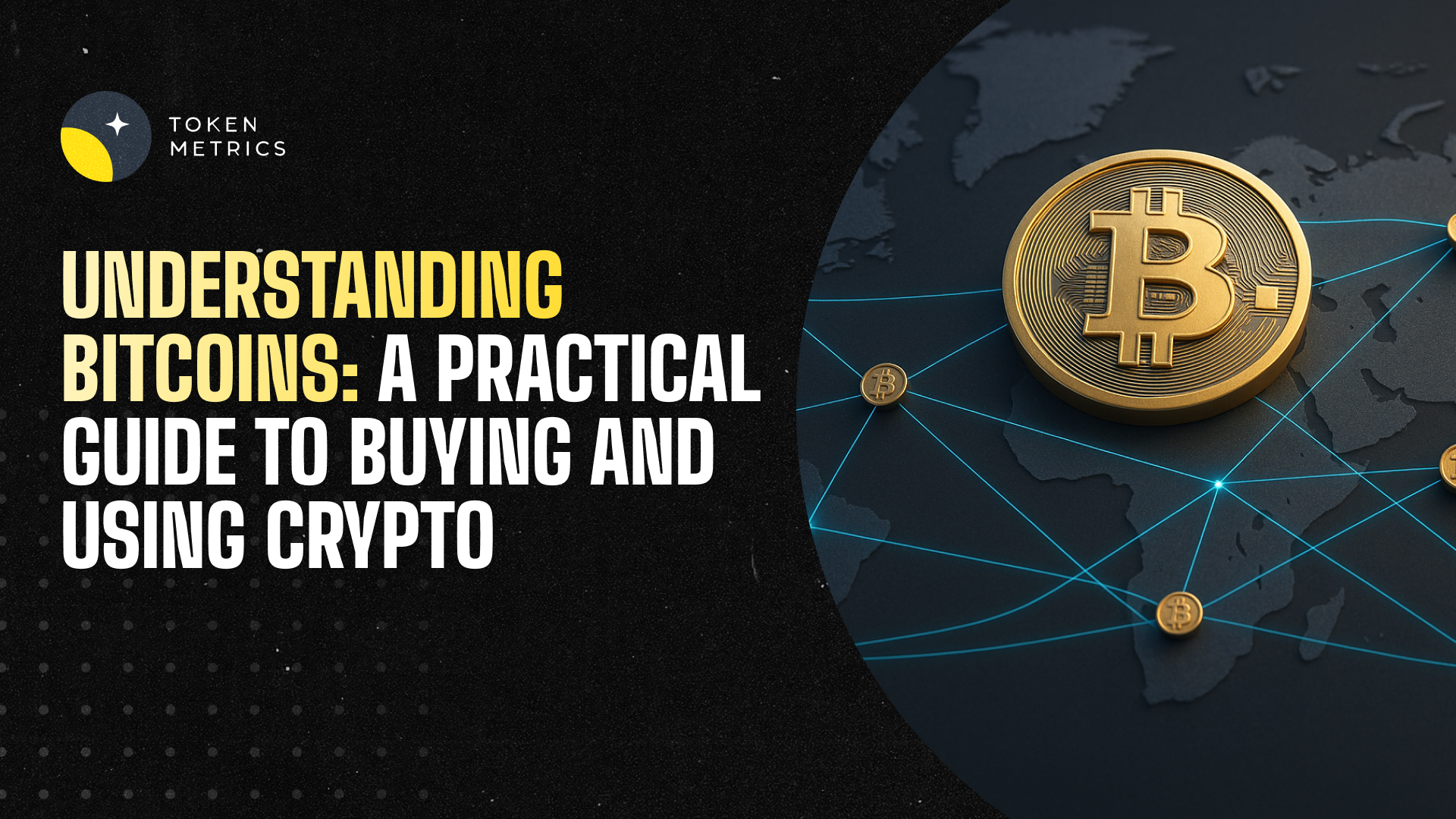

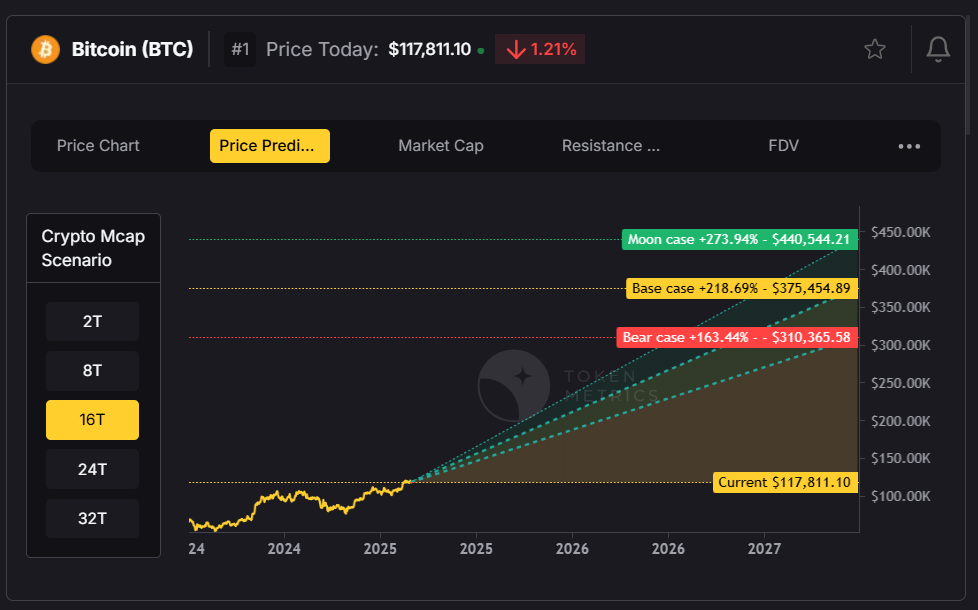

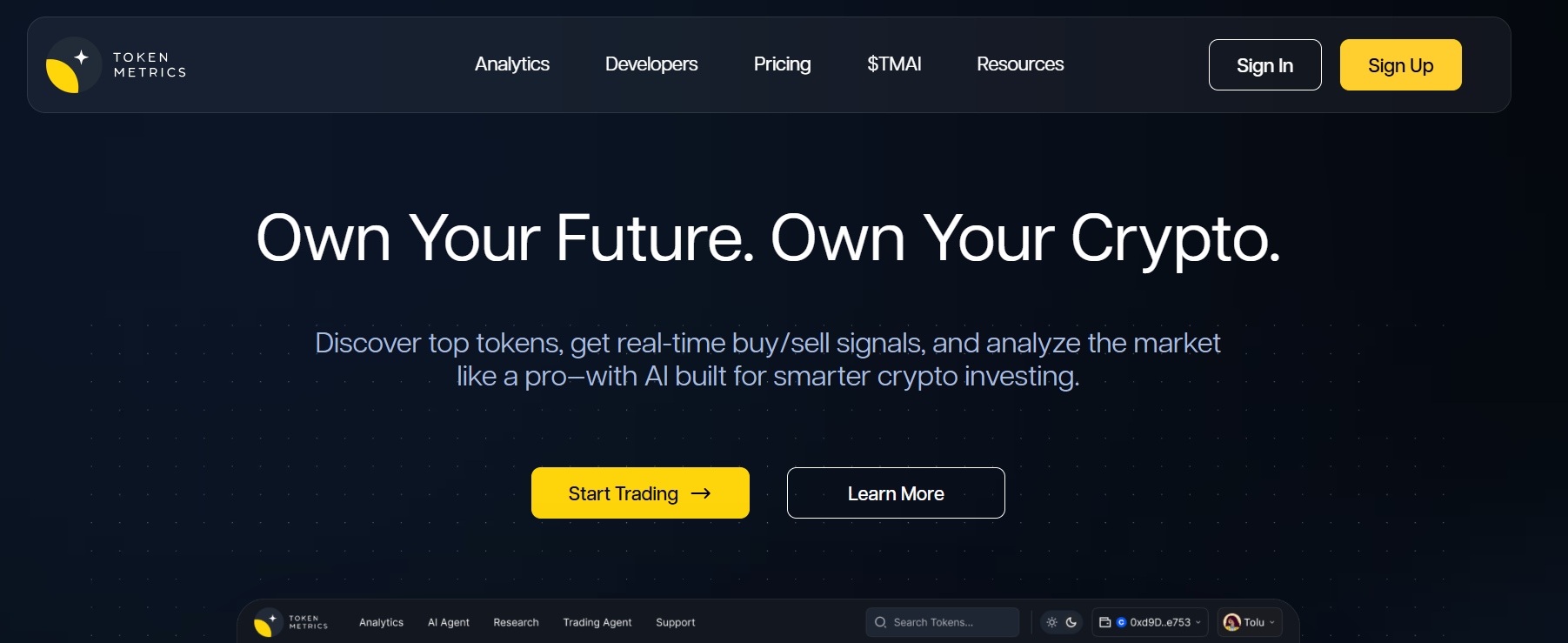
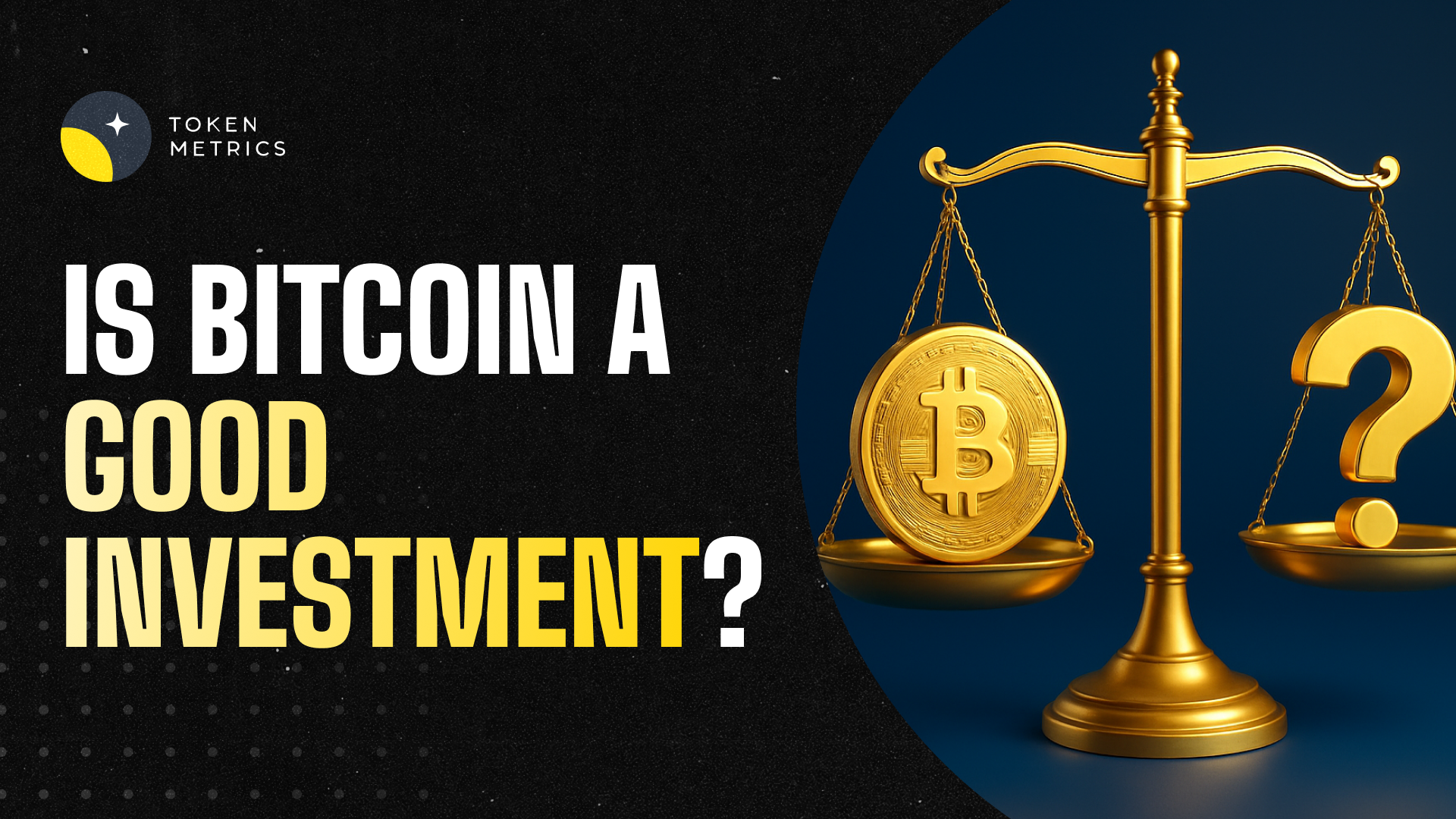
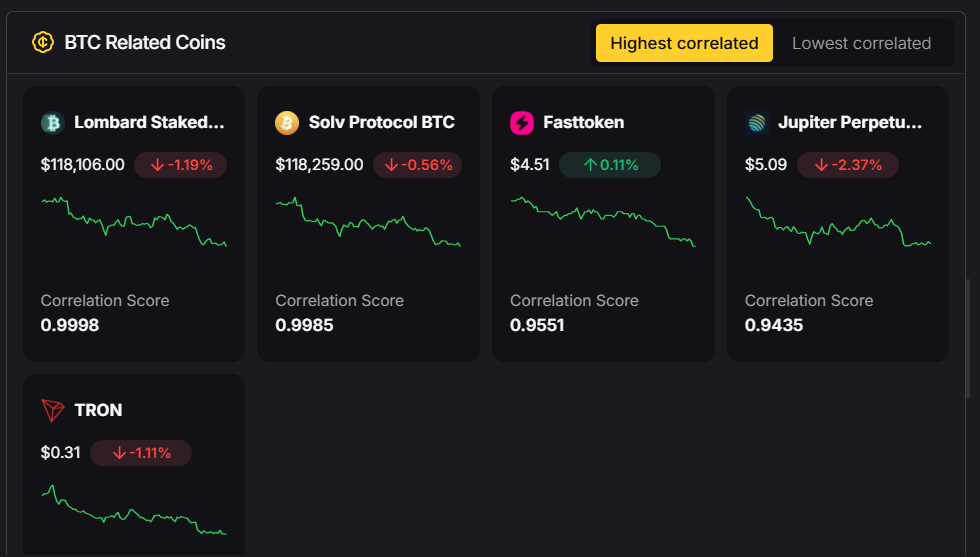





.svg)




.png)